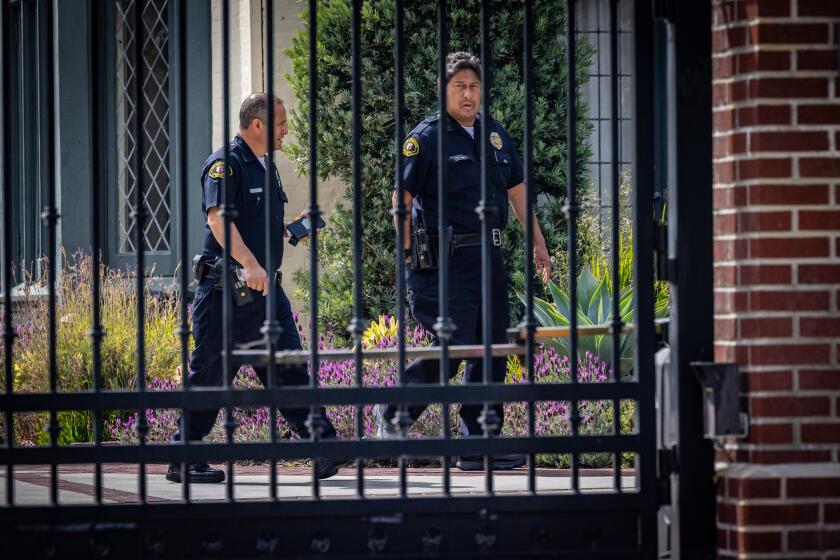Hollywood lobbies to extend tax credit for California filming
Hollywood wants a $500-million blockbuster out of Sacramento.
In the final days of the legislative session, the industry is seeking a five-year extension of a tax credit for producing films and television shows in California. It has assembled a powerful coalition of moguls and unions, who argue that failing to re-up the program risks losing film jobs to states offering even more generous rebates.
That is something, advocates argue, that the state with the second-highest jobless rate in the nation cannot afford. “This is a proven program that creates jobs and stimulates the economy,” said Vans Stevenson, senior vice president of government affairs for the Motion Picture Assn. of America. “Our companies are all based in California, and we want to see the industry grow here.”
But California is also the state with the largest budget deficit, and opponents balk at reserving $500 million for industry incentives at a time when lawmakers are slashing social services, laying off teachers and raising tuition at public universities.
“It’s a little unusual to me that a Democratic-controlled Legislature would give $500 million to corporations when they’ve so viciously cut poor people and sick people over the last four years,” said Dave Low of the California School Employees Assn., one of the few unions to oppose the measure.
The debate comes as many states — spurred by the economic downturn — have begun to question the efficacy of using public money to lure film production. At least five states have ended or suspended their programs in the last two years.
Still, nearly 40 states continue to have some sort of film incentive, and there is little doubt that many have poached productions from California. “Battle: Los Angeles,” for example, was filmed mainly in Louisiana, which has an aggressive program to lure Hollywood shoots. The HBO series “Mildred Pierce” was set in Glendale but filmed in New York. Producers had to import palm trees.
The proposal to extend California’s film credit sailed through the Assembly. But in the Senate, the extension was limited to $100 million over a single year, contingent on the state hitting revenue targets through 2011. Should they drop, up to $4 billion in cuts would land on colleges and kindergarten-through-12th-grade education in January.
“I don’t think it would be the right signal to extend the tax credit under those circumstances,” said Senate President Pro Tem Darrell Steinberg (D-Sacramento).
But a single-year-extension, the bill’s backers say, is not enough. “It’s important for us to … signal to the industry that California is committed to [its] future,” said Assemblyman Felipe Fuentes (D-Sylmar), author of the bill.
The initial tax credit passed as part of the 2009 budget deal between the Democratic Legislature and an avid film industry supporter, Gov. Arnold Schwarzenegger. The $500-million program gives a rebate of up to 25% of qualified production expenses. It can be used to offset any sales or business-use taxes that production companies have with the state but cannot be used to pay actors’ salaries.
“The people this benefits aren’t living in Brentwood or Beverly Hills,” said Thom Davis of Local 80 of the International Alliance of Theatrical Stage Employees, noting that large film shoots employ up to 300 cast and crew members, such as grips and camera operators. “They live in Reseda, Burbank and North Hollywood. Every time one of my members isn’t working, they are collecting unemployment benefits. And that doesn’t benefit business or the California economy.”
Although the initial program ran through 2014, more than $400 million in rebates — which are allocated on a first-come, first-served basis — have been distributed. The last ones are expected to go out next summer. Fuentes said that if he can’t persuade the Senate to grant an extension of more than one year, he may opt to try again when the Legislature reconvenes in January. For the program to continue in 2012, a two-thirds vote of the Legislature would be needed to implement it on an expedited basis.
In arguing for a full extension, advocates cite a study by the Los Angeles County Economic Development Corp. that found the program so far had pumped $3.8 billion into California’s economy and created 20,000 jobs.
Skeptics noted that the study was sponsored by the MPAA and that some examinations of other states’ programs have found they don’t create enough jobs to recoup their cost.
Jean Ross of the California Budget Project, which advocates for greater spending on social services, said that the annual $100-million cost of the credit is about the same amount the Legislature has hiked community college fees. “In essence,” she said, “we have taxed community college students to give a tax break to Hollywood.”
Riccardi reported from Sacramento, and Verrier from Los Angeles.
More to Read
Start your day right
Sign up for Essential California for news, features and recommendations from the L.A. Times and beyond in your inbox six days a week.
You may occasionally receive promotional content from the Los Angeles Times.







